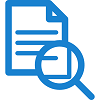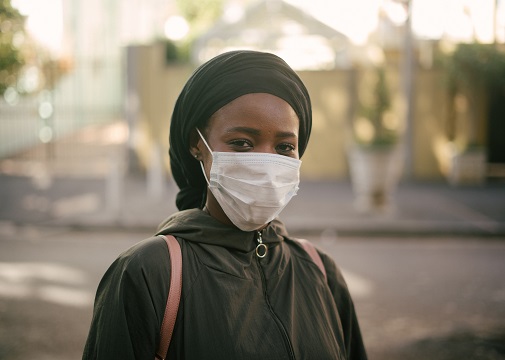EF Covid Health” platform: a swift mechanism for customised support to African authorities
Although the Covid-19 epidemic is so far more limited than initially anticipated in Africa, the health systems remain vulnerable: in many countries, they are in a situation whereby they may not be able to cope with a sudden rise in cases. The fear of the pandemic may also make some people stay away from health systems, which can affect the treatment of other diseases.
“Despite the fatigue and economic priorities, we need to continue to contain the spread of the virus, with support from activities that have proved effective”, explains Eric Sattin, a public health doctor and expert in health cooperation, health systems strengthening and epidemic control on the “EF Covid Health” platform. It is therefore essential to apply a range of measures – prevention, an active search for cases and contact cases, isolation… – for an effective health management of the epidemic. The “EF Covid Health” technical assistance platform is working on this with partner countries that request it.
The platform, a swift response in an unpredictable environment
“Our response was almost immediate following the announcement of the pandemic by the World Health Organization on 11 March”, says Maryse Simonet Camara, technical coordinator of the platform. To address the emergency, Expertise France is taking action alongside Team France to structure the future “EF Covid Health” platform.
The problem is that in the spring of 2020, the international travel restrictions prevented the deployment of technical experts in the field and the proliferation of information about the new virus made it difficult to develop an effective response plan. “One of the strengths of Expertise France lies in its network of health experts in the field”, points out Caroline Comiti, head of the Technical and Cross-functional Assistance Unit in Expertise France’s Health Department. The platform therefore decided to draw on the support of these health experts who were already residents on the ground and very familiar with national situations: they became focal points.
 One of the strengths of Expertise France lies in its network of health experts in the field
One of the strengths of Expertise France lies in its network of health experts in the field
In Chad, this has enabled Expertise France to take swift action alongside the authorities. “Thanks to Expertise France’s Covid-19 platform, back in June 2020, we benefited from the documentary review and specific training organised in a webinar format. This training was highly appreciated”, explains Professor Choua, coordinator of the Covid response at the Office of the President of the Republic of Chad.
In Paris, the coordination team was gradually reinforced by an interdisciplinary unit of reference experts competent in health, development cooperation and health crisis management, covering key issues to fight against Covid-19 (infection prevention and control, health security, laboratory monitoring and tests, communication on health risks…).
Fighting against a pandemic and infodemic wave
“We had many unknown factors about the impact of the epidemic in Africa, in particular concerning the weak health systems with little resilience”, explains Caroline Comiti. In late March, the members of the platform consequently began to develop the documentary database, a key component of the mechanism. There was indeed an abundant amount of information about the new virus: “At the time, the infodemic was a real issue”, explains Maryse Simonet Camara. “Our objective was to structure a mechanism gathering validated knowledge about Covid-19”, she says, “while reporting information from the field, to document national health situations and identify needs”.
 Gathering validated knowledge about Covid-19, while reporting information from the field
Gathering validated knowledge about Covid-19, while reporting information from the field
In mid-October, the database already contained over 1,500 sorted documents. Team France (embassies, AFD Group…) and Team Europe (European Union, Member States…) can use this information through the network of focal points to direct their financial support. The 14 focal points – there were initially 12 – can also draw on the documentary database and team of reference experts to help ensure that validated knowledge about Covid-19 that is relevant to the different national contexts is taken into account.
Complementary expertise mobilised
These focal points play a key role in advising and supporting the authorities in their respective countries. “The platform’s real added value lies in its contextualised support, so that it can offer customised solutions which partner countries can take ownership of and implement”, points out Maryse Simonet Camara. “The African response cannot be the European response. In areas where the median age is about 20, the focus should not be on intensive care: we should be maintaining essential health services and protecting nursing staff”, says Caroline Comiti.
 The platform’s real added value lies in its contextualised support
The platform’s real added value lies in its contextualised support
To ensure they play an effective advisory role, the focal points benefit from training organised by the team of experts in Paris on themes related to the management of the pandemic. “Indeed, although they were health experts, the focal points weren’t specialised in the management of health crises or epidemics, which is a speciality in itself”, says Caroline Comiti, “so we had to assist them in this area”. Epidemiology, infection prevention and control, management of Covid cases, preparation of health systems for vaccination… Twelve training sessions have been organised for the focal points since the end of March. Some involve helping the focal points share their experience of both the country and platform with the network. This interdisciplinary approach provides a more comprehensive approach to the issue in the interests of coherence, complementarity and knowledge reconciliation.
 A network of experts that includes professionals from the French health system, working in Chad, for example
A network of experts that includes professionals from the French health system, working in Chad, for example
Furthermore, the platform helps the authorities define their training needs and responds to certain urgent requests related to the pandemic. It is supported by its network of experts which, through partnerships, includes professionals from the French health system, for example, from the AP-HP Paris hospitals, the Institut Pasteur and soon from the World Health Organization Collaborating Centre for Research and Training in Mental Health (WHOCC).
For example, in Chad, back in August 2020, the expertise of the Institut Pasteur helped train laboratory staff. Then in September 2020, the platform allowed resuscitators from the AP-HP to provided technical assistance to Chadian resuscitators. This was a first stage of an assistance that aims to explain and address the excess mortality from kidney failure observed in intensive care through validated and appropriate solutions. “We don’t do things “in the place of”: the objective is to help bring about practical solutions, firstly by balancing the short and long term and, secondly, science and the realities on the ground”, says Caroline Comiti.
Assisting countries with customised solutions
“We needed to take swift and coordinated action, but ensuring that we worked with the health authorities in partner countries without taking their place”, says Maryse Simonet Camara. The coordination between emergency and development is a key aspect: “The important thing was to develop appropriate know-how to respond to the epidemic, while strengthening the health systems in partner countries”. Maryse Simonet Camara adds: “We must remember that infection prevention and control, especially in essential healthcare services, are both a key response to the Covid crisis and a long-term resilience strategy for health systems.”
 In Guinea, we have worked with the health authorities to adapt the response to Covid, which is less deadly than Ebola but more contagious
In Guinea, we have worked with the health authorities to adapt the response to Covid, which is less deadly than Ebola but more contagious
Following the Ebola epidemic, Guinea had structured an epidemic response mechanism. This included the creation of the National Health Security Agency (ANSS), which is now coordinating the response. It was necessary to develop a specific response, as the new virus does not have the same characteristics: “We’ve worked with the health authorities to adapt the response to Covid, which is less deadly than Ebola but contagious before the onset of symptoms”, says Caroline Comiti.
“We’ve been able to use the documentary database, which is an invaluable decision-making tool for the health authorities, for example, for the use of Covid tests, the choice of masks, the management of corpses, the preparation of the national vaccination plan…”, explains Sandrine Ségot-Chicq, technical advisor to the Director General of ANSS. The team of three experts working in Conakry has therefore been able to advise Guinea on the policy for prevention, crisis communication, the monitoring-evaluation of the strategies implemented, the use of Covid tests, the preparation of the national vaccination plan…
Maintaining the momentum
The reorganisation of the health services affected by Covid-19 is another major challenge, as a number of target publics – pregnant women, parents of children who need to be vaccinated – may have stayed away from health systems for fear of being infected. For example, maintaining efforts against other diseases is a priority issue for health crisis management. L'Initiative, a facility implemented by Expertise France and complementary to the Global Fund to fight AIDS, Tuberculosis and Malaria, has adapted its support to this end: “It is vital to maintain essential services to fight against the three pandemics, despite the crisis caused by Covid-19”, says Eric Fleutelot, Technical Director of the Major Pandemics Unit in Expertise France’s Health Department.
 We would like to formalise a mechanism that can be redeployed in the event of other health crises
We would like to formalise a mechanism that can be redeployed in the event of other health crises
While a number of European countries are now faced with a second wave, “our challenge lies in maintaining this commitment over time”, says Caroline Comiti, “until there is a vaccine available and sufficient herd immunity”. “Based on the innovative experience of this platform, we would like to formalise a mechanism that can be redeployed in the event of other health crises to support partner countries, Team France and Team Europe. An external evaluation should provide input for the formalisation of a swift mechanism, a sort of emergency ‘white plan’ for development cooperation, targeting health technical expertise”, says Maryse Simonet Camara.
 Find out more on the “EF Covid Health” platform
Find out more on the “EF Covid Health” platform


